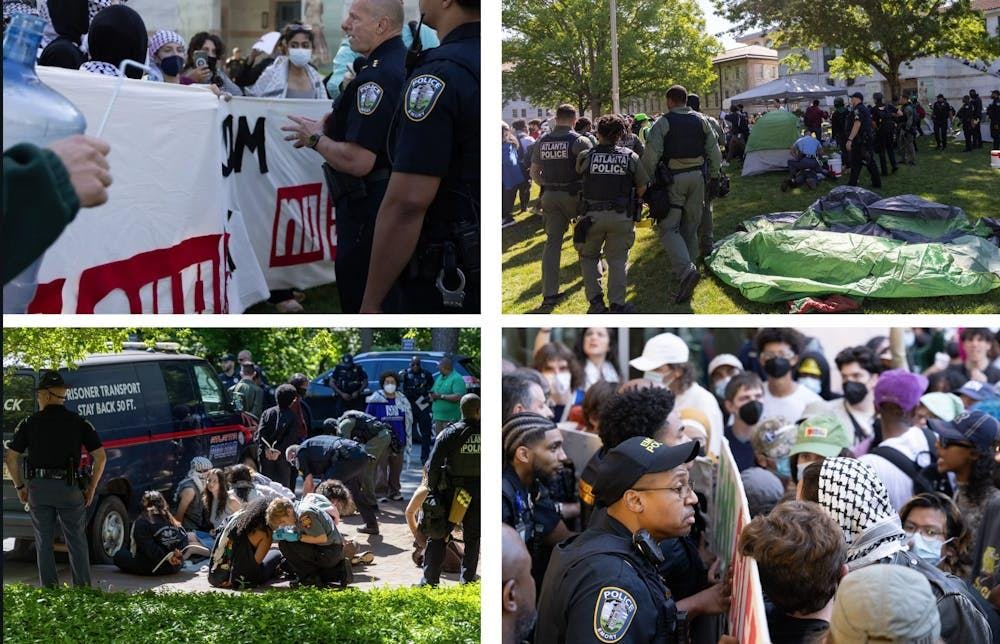April 25 Timeline
7:45 a.m.: Approximately 45 to 50 protesters assembled on the Emory University Quadrangle, setting up an encampment including tables, chairs, tents and fake blood-covered bodies wrapped in blankets.
9:00 a.m.: Atlanta Police Department (APD) and Georgia State Patrol (GSP) arrived to assist the Emory Police Department (EPD) around 9 a.m.
9:17 a.m.: Deputy Chief of the EPD Timothy Powers verbally gave protesters 10 minutes to disperse. Protesters began to bang on plastic buckets and chanted, “Cops off the lawn.”
10:30 a.m.: APD and GSP officers began to surround the encampment and arrest some protesters. Law enforcement arrested 28 demonstrators, 20 of whom were Emory community members, including Philosophy Department Chair Noëlle McAfee. A GSP officer tased a protester four times after they resisted arrest. Officers also deployed PepperBall, a crowd control projectile that dispersed the crowd using irritating pepper powder.
5:30 p.m.: Approximately 500 protesters regathered on the Quad after most of the police presence left. Throughout the day, protesters gathered around campus in small groups.
6:00 p.m.: Roughly 300 protesters moved from the Quad to the Candler School of Theology, where more protesters sat inside. Additional GSP officers and the GSP Crime Suppression Unit (CSU) arrived at the protest.
7:00 p.m.: Pro-Israel demonstrators organized outside of Ali’s Cookies in Emory Village that evening in support of the Jewish business owners who had allegedly received a postcard saying “Gas the Jews.”
7:30 p.m.: A confrontation between protesters and officers took place in front of the Candler front doors as protesters attempted to pin officers with homemade wood signs against the doors. Additionally, protesters threw water bottles at the police after the police refused protesters access to the building. CSU officers deployed 15 to 20 rounds of PepperBall five feet in front of the protesters. According to police reports obtained by The Emory Wheel, EPD had requested protesters be denied access to campus buildings to prevent destruction.
8:32 p.m.: After the confrontation in front of Candler, protesters returned to the Quad, where approximately 50 officers stood on the far side of the Quad. Protesters began linking arms to form a circle and set up a smaller encampment with sleeping bags and tents on the Quad.
8:56 p.m.: After the protest leaders told the crowd to leave, the protesters cleaned up the encampment and left the Quad.
April 26 - May 16
Following April 25, Emory’s encampment and protests made nationwide news. In addition to Emory, protests erupted at other universities such as Columbia University (N.Y.), New York University and the University of Southern California on April 25, 2024. At Emory, various protesters spoke out against the University’s response to the previous day’s demonstration, which resulted in 28 arrests.
The DeKalb County Magistrate Court released protesters arrested on April 25, 2024, in the afternoon of April 26, 2024.
Protests continued into the following day, April 27, 2024, with pro-Palestine protesters who strung up signs and linked arms in solidarity on the structure for the upcoming commencement stage.
On the same day, the Student Government Association (SGA) condemned the arrests at the protest and the University’s response. In addition, the SGA introduced a referendum for students to vote on their confidence in University President Gregory Fenves.
By the last day of classes on April 29, 2024, many professors had altered their plans for final exams or canceled them altogether. At noon, pro-Palestine students and faculty organized a walkout from classes. Student protesters yelled, “Fire Fenves” during a protest around Asbury Circle. The Emory College of Arts and Sciences College (ECAS) Senate voted to send out an electronic ballot to ECAS faculty on their confidence in Fenves.
On April 30, 2024, CAIR-Georgia and the Atlanta Multifaith Coalition for Palestine held a press conference in front of the Peavine Visitor Parking Lot. The organizations denounced the University’s response to the protests on April 25, 2024, and continued demands for disclosure and divestment from endowments from Israel. In addition, the Oxford College Student Government Association passed a resolution calling for Fenves to be removed from his position.
On May 1, 2024, the seventh day of protests, Chabad at Emory Rabbi Zalman Lipskier led Jewish and pro-Israel students in prayer in resistance to the ongoing protests. Later that day, both pro-Israel and pro-Palestine demonstrators continued to advocate for their causes across from each other on the Quad.
The ECAS faculty voted 75.05% for “no confidence” in Fenves on May 3, 2024, after over 90% of Oxford College faculty members voted “no confidence” in the University president.
By May 6, 2024, the U.S. Department of Education’s Office for Civil Rights (OCR) opened an investigation into anti-Palestinian harassment at Emory after CAIR-Georgia and Palestine Legal filed a complaint on behalf of Emory Students for Justice in Palestine (ESJP) on April 5, 2024.
On May 8, 2024, 73.5% of undergraduate students voted that they had “no confidence” in Fenves. In total, 3,401 students cast ballots in the referendum.
On May 6, the University relocated commencement to the Gas South District in Duluth, Ga., and canceled its annual Class Day Crossover following the protests on campus due to safety concerns.
Student protests continued at the 2024 Commencement Ceremony on May 13, 2024. Pro-Palestine students displayed their resistance by yelling “Free Palestine” from their seats and holding keffiyehs and Palestinian flags.
Fall 2024-Spring 2025
Before classes began in the fall 2024 semester, University President Gregory Fenves added an addendum to the former Respect for Open Expression Policy. This policy prohibited encampments, building occupations and protests between midnight and 7 a.m. — all activities that occurred during the protests following April 25, 2024. Fenves said that the addendum clarified practices previously upheld by Emory toward open expression on campus.
According to University Senate President and Professor of Law George Shepherd and Committee for Open Expression Chair Ilya Nemenman, Fenves allegedly took action without consulting the University Senate.
The same week, most students returned to campus, chalkings saying “Emory arrests profs” and “Emory teargasses students” appeared on Eagle Row and in front of the Emory Student Center on Aug. 24, 2024. These chalkings came after CAIR labeled the University an institution of “particular concern” for creating a “hostile campus environment” for pro-Palestine students. In a press release, the CAIR said the complaint was filed on behalf of ESJP by CAIR-Georgia and Palestine Legal.
Students returned to campus amid ongoing discourse over revising the Respect for Open Expression Policy. SGA passed a resolution condemning Fenves’s addendum on Sept. 9, 2024. Additionally, SGA requested the University withdraw the addendum to allow input from the University Senate, which includes student representatives. However, SGA tabled a second resolution, which stated the addendum infringed upon students’ right to “peacefully” assemble, on Sept. 23, 2024. SGA tabled the resolution due to concerns that passing it would curtail the relationship between SGA and Fenves, making future communication and negotiation difficult.
In the first major protest since the Spring 2024 semester, about 200 pro-Palestine protesters gathered in front of Convocation Hall on Sept. 12, 2024, to protest the ongoing conflict in the Middle East. While the protest was largely peaceful, SGA passed a resolution condemning an Instagram story post they considered antisemitic. The Instagram story consisted of a picture of pro-Israel students and the caption “Started smelling like pennies on the quad…”
On Sept. 18, 2024, more than 60 Emory faculty members participated in a vigil to protest for academic freedom and shared governance in response to the new addendum.
Ultimately, the University Senate created a new subcommittee to revise the Respect for Open Expression Policy, on Sept. 25, 2024. ECAS College Senate President-Elect Clifton Crais and University Senate President-Elect Noëlle McAfee said the goal of the new policy would be to make Emory’s practices more accessible by using content-neutral language.
The Emory Divest Coalition and Emory Students for Socialism hosted a protest on Oct. 4, 2024, in solidarity with the pro-Palestine movement. Students marched from the Emory Student Center to the Oxford Road Building. After marching to the Oxford Road Building, protesters marched through the building.
The University feared for the potential events that would ensue on the anniversary of the Hamas attacks on Oct. 7, 2023, that marked the beginning of the Israel-Hamas war. Emory Hillel, Emory-Israel Public Affairs Committee and Eagles for Israel hosted a vigil to honor the lives of those lost in the Oct. 7, 2023 attacks on Israel. The following day, ESJP, Emory Muslim Students Association, Emory Arab Cultural Association and Emory Divest hosted a memorial to commemorate lives lost in Gaza and Lebanon.
After the U.S. Department of Education’s OCR opened an investigation into anti-Palestinian and anti-Muslim harassment in March 2024, the University reached an agreement to settle the case on Jan. 23. Emory affirmed it would meet specific measures, including revising nondiscrimination policies, adjusting campus protesting policies and improving anti-discrimination training among faculty.
On Feb 5, U.S. President Donald Trump signed an executive order threatening to deport “pro-Hamas” students to fight antisemitism. Additionally, a recent memorandum from the Department of Homeland Security claims it will screen the social media accounts of “aliens” for antisemitic posts.
On March 20, after five months of work by the University Senate’s open expression subcommittee, Emory adopted a new Open Expression Policy. In the new policy, Emory agreed to a content-neutral approach to handling expression. Additionally, the new policy clarified time, place and manner restrictions, which Shepherd said would align with the First Amendment.
The Trump administration has revoked hundreds of visas for students, among them many who engaged in pro-Palestine protest efforts. By April, the Trump Administration had canceled around 530 visas. Immigration and Customs Enforcement (ICE) deported Mahmoud Khalil, a Columbia University graduate and legal permanent resident, which has drawn attention following his participation in various recent pro-Palestine demonstrations.
On April 8, Interim Provost and Executive Vice President for Academic Affairs Lanny Liebeskind announced that U.S. ICE had terminated the visa records of three Emory alumni and one current student on the Student and Exchange Visitor Information Program database.

Jacob Muscolino (he/him) (28C) is a News Editor at The Emory Wheel. He is from Long Island and plans to major in History and Psychology. Outside of the Wheel, he is involved in Emory Reads and Emory Economics Review. You can often find Jacob watching the newest blockbuster for his Letterboxd, dissecting The New York Times and traveling to the next destination on his bucket list.









